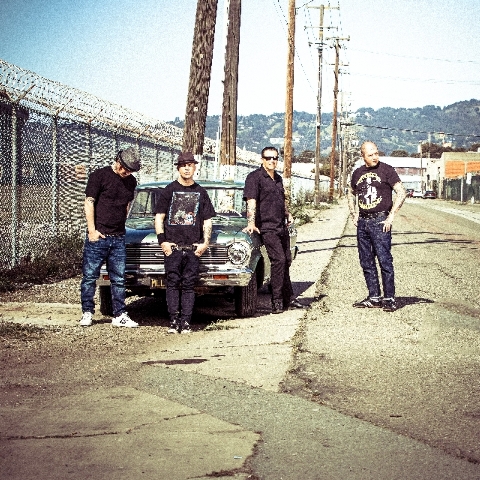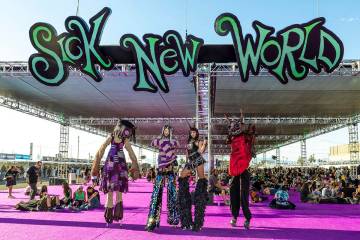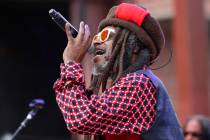The Good From The Bad
Rancid are punk rock’s id, ego and superego all at once.
Simultaneously conscientious, confrontational and as fun-loving as a teenager with a skeleton key to the family liquor cabinet, they’re good at being bad and bad at being good.
They’re also impressively consistent.
The group’s been putting out records for 20 years now, and they’ve yet to put out a poor one.
In honor of Rancid’s stop in town this weekend, let’s rank the band’s seven full-length records, all of which they will likely visit Sunday at the House of Blues.
7. “Let the Dominoes Fall” (2009): “This is my life,” Tim Armstrong sings on harmonica-peppered album closer “The Highway,” an ode to the road. “It’s all I’ve ever known.”
Armstrong sounds completely comfortable with this, his station in life, and the rest of the record follows suit: This is Rancid at their most self-assured and unflappable.
They sing of class warfare and actual warfare, of soldiers and survivors, coming hard on rock ’n’ roll battering ram “Damnation” and the cocksure, sandpaper-coarse ska of “I Ain’t Worried.” But for the most part, Rancid sounds like a band comfortable with the knowledge that, by this point, their legacy had become as indelible as all that ink tattooed into their necks.
“I know times are changing, and there’s a new sound,” Armstrong slurs on “Locomotive.” “I’m glad you all made it. It’s good to have you around.”
Likewise.
6. “Indestructible” (2003): Tim Armstrong’s heart was as black and blue as his knuckles on this record written after he split from his ex-wife, then-Distillers singer-bassist Brody Dalle. The breakup catalyzed one of Rancid’s best tunes, “Fall Back Down,” a stirring punk rock bear hug about getting through hard times with the help of one’s friends, as well as the alternately wistful and defiant, organ-powered pick-me-up “Tropical London,” a song about being burnt by former flames.
Elsewhere, there’s a slew of overlooked gems like punk-’til-death anthem “Spirit of ’87” and the ska-inflected ”Memphis,” with its touches of New Wave-worthy keys, songs whose vitality and punch-drunk charm doubled as the thread stitching shut love’s wounds.
5. “Life Won’t Wait” (1998): Here, Rancid excavated their roots, digging into punk rock’s substratum to unearth the ska, barroom blues and rockabilly buried beneath a topsoil of ’tude. The band’s most diffuse, guest heavy album, with contributions from reggae great Buju Banton, The Specials guitarist Roddy Radiation, Mighty Mighty Bosstones frontman Dicky Barrett, Agnostic Front singer Roger Miret, Jane’s Addiction drummer Stephen Perkins and dozens more, this disc plays like random selections from a jukebox stocked with the band members’ favorite records.
Partially recorded in Jamaica, there’s steel drums and dance hall toasting (“Life Won’t Wait”), horn-powered vamps (“Backslide”), touches of hip-hop (“Cash, Culture and Violence”), hard-eyed Americana (“Lady Liberty”) and a whole lot more spread out over 22 wide-ranging tracks. Sure, Rancid’s reach may have exceeded their grasp in places, but, hey, it’s hard to grasp things with a clenched fist anyway.
4. “Rancid” (1993): Urban blight set to a relentless beat, this album was as indivisible from the East Bay streets as the cracked asphalt in the back alleyways where these dudes once prowled, chronicling their exploits with the grim detail of a war reporter. Singer-guitairst Lars Frederiksen had yet to join the band, so Armstrong and bassist Matt Freeman are the ones leaving fingerprints around windpipes here.
The song titles were self-explanatory — “Get Out of My Way,” “Animosity,” “Injured” — and as straightforward as the tunes themselves. There was the Stones-y swagger of “Outta My Mind” and the rap-influenced vocals on “Hyena” and “Rats in the Hallway,” but for the most part, this was hard, direct, desperate punk rock as lean and mean as the underfed dudes who made it.
3. “Rancid” (2000): Rancid’s fiercest, most unrelenting album, this is the band channeling the GBH patches on their studded leather jackets, all hoarse throats and polyp-smothered vocal cords earned by shouting in contempt at the world around them.
As direct as its predecessor was varied, the record explodes with minute-long missives that blast forth in every direction like punk rock shrapnel, a full-clip of war-ravaged, bullet-ridden outrage as fatalistic and death-evoking as the skull and bones depicted on the album cover. “I gnash, spit, I grind my teeth,” Frederiksen growls on a record that’s the sound of molars being ground to the gumline.
2. “Let’s Go” (1994): This disc was to mid-’90s punk rock what that adrenaline shot was to Mia Wallace’s heart. An album that could double as a singles collection, “Let’s Go” introduced bottle hurling, mohawked hooligans to the MTV masses, countering the suburban ennui of Green Day and the lovable loser pose of the Offspring.
There was a grizzled, hard-earned authenticity about Rancid and, by extension, this record as well — it just felt real, so much so, that you could practically smell the nostril-assailing aroma of cheap beer and sweat dampened denim that this bunch came cologned in. There’s a ton of tunes here that several generations of punk fans have lost their voices shouting along to — “Salvation,” “Radio,” “Side Kick” — but also plenty of lesser known ragers like “Harry Bridges,” “Burn” and “Midnight” that would be stand-outs in any other band’s catalog. Once “Let’s Go” gets going, it just doesn’t stop.
1. “... And Out Come the Wolves” (1995): The album begins the same way a lit fuse ends: with a bang, ala “Maxwell Murder,” a 90-second joyride sans the joy with a bass solo capable of dislocating the digits of a lesser player than Matt Freeman. This was to be expected from a band like Rancid. What wasn’t was just how pop savvy and melodically refined a good portion of the remainder of the album would be in the form of radio-bound hits like “Ruby Soho,” “Time Bomb” and “Roots Radicals.”
How good is this record? Eighteen years after its release, Rancid still routinely plays more than half of its 19 tunes per show. This was the band’s biggest album, and they seemed to foresee as much. “So many bands to be heard,” Armstrong sang on “Disorder and Disarray,” a song about opportunists invading the punk scene. “Just for once can’t I be ignored?”
Not then.
Not now.
Contact reporter Jason Bracelin at jbracelin@
reviewjournal.com or 702-383-0476.
Preview
Rancid
6 p.m. Sunday
House of Blues at Mandalay Bay, 3950 Las Vegas Blvd. South
$31-$33 (702-632-7600)




























